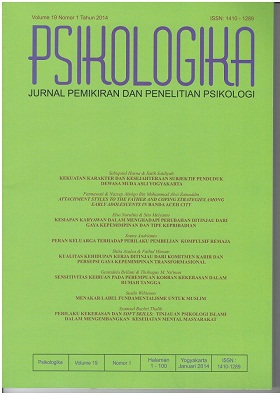Main Article Content
Abstract
This present study sought to investigate the relationship between attachment styles to the father and coping strategies among early adolescents. The population that has been studied was the seventh grade students ofin one of junior high school in Banda Aceh city that meet the established criteria, specifically at least 12 years old and still have father. The sampling technique applied was universal sampling because the number of eligible population was only 81 students. Total of samples taken consists of 31 males and 50 females. In this study, research instrument used was two different scales, namely Adult Attachment Scale (AAS, Collins & Read, 1990) to measure attachment styles to the father and Self-Report Coping Scale (SRCS, Causey and Dubow, 1992) to measure coping strategies. Statistical test through Regression Analysis was operated to examine the hypothesis. Results showed that close attachment to the father, dependent attachment to the father, and anxiety attachment to the father were positive and strongly correlated with both coping strategies (approach coping strategy and avoidance coping strategy). Hence, it could be concluded that all types ofattachment styles to the father among early adolescents could affect to the choice of either approach coping and avoidance coping.
Keywords: attachment styles to the father, coping strategies, early adolescents
Article Details
Authors who publish with this journal agree to the following terms:
- Authors retain copyright and grant the journal right of first publication with the work simultaneously licensed under a Creative Commons Attribution-ShareAlike 4.0 International License that allows others to share the work with an acknowledgment of the work's authorship and initial publication in this journal.
- Authors are able to enter into separate, additional contractual arrangements for the non-exclusive distribution of the journal's published version of the work (e.g., post it to an institutional repository or publish it in a book), with an acknowledgment of its initial publication in this journal.
- Authors are permitted and encouraged to post their work online (e.g., in institutional repositories or on their website) prior to and during the submission process, as it can lead to productive exchanges, as well as earlier and greater citation of published work (See The Effect of Open Access).




